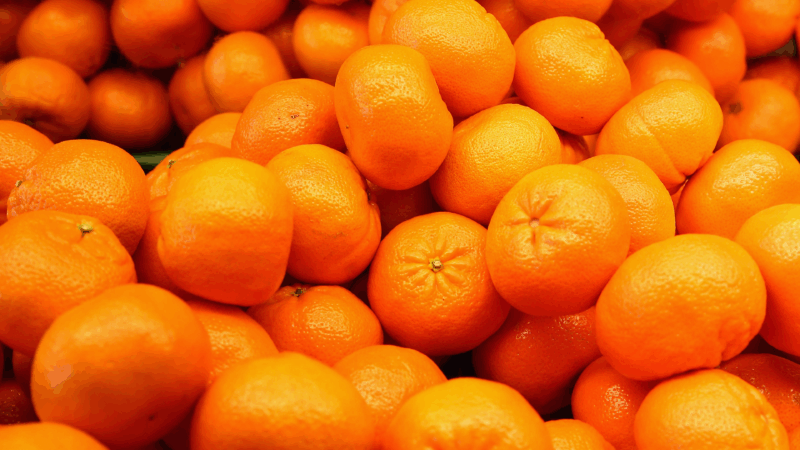Supermarket displays of oranges will never look the same after reading ‘Foreign Fruit’
In a modern supermarket, shiny globes of oranges are stacked in pyramids. They appear identical and in their seeming perfection, unremarkable, a mundane fruit to slice into wedges and pack in a child’s lunchbox.
But as Katie Goh unravels in Foreign Fruit: A Personal History of the Orange, underneath its pitted skin, the orange contains multitudes. “Citrus is fruit that freely betrays,” Goh writes. “Plant a seed from an orange and any of the fifteen hundred species of the Rutaceae family, commonly called the citrus family, could grow from its burial place.”
Humans have stepped in to curb the citrus family’s tendency to cross-pollinate by grafting branches from trees they wish to replicate on sturdy rootstock, ensuring the consistent production of one kind of fruit. But as anyone who has snacked on clementines and tasted differing levels of sweetness and acidity from fruit to fruit knows, attempts at control can only go so far. As Goh explains, the orange “is a fruit born with inherent divergence in its genes.”

It is this unrepentant multiplicity that spurred Goh to look deeper at the orange in Foreign Fruit, an elegant hybrid memoir about hybridity that pulls apart mythologies of colonialism, inheritance and identity like the segments of a citrus fruit. Like the orange, Goh is multiple: She is a queer person of Chinese, Malaysian and Irish heritage who was raised in Northern Ireland. And like the orange, her family’s history comprises “ancestral roots in China that venture towards the equator, and then traverse the long roads from east to west to reach Europe.” In retracing that history, Goh refuses simple stories, instead conjuring a complex, finely woven exploration of the citrus and the self.
Goh began peeling back layers in March 2021, when a 21-year-old white man killed eight people, six of them Asian women, in shootings at two spas in the Atlanta area. The next morning, Goh received a query from an editor with the subject line “Asian hate crimes?,” asking for an 800-word piece on the shootings from her perspective. Instead of accepting the commission, Goh writes that she sat down at her parent’s kitchen table near Belfast and ate five oranges, “fistfuls of flesh” that left her jaw aching and her body “hot and heavy and full.”
Eating those five oranges in that moment of pain and frustration led Goh to see the fruit anew and pointed her toward a new method of self-expression. She had begun her writing career while in college in the 2010s, at the height of what critic Laura Bennett termed the “first-person industrial complex,” where women were encouraged to commodify traumatic experiences by packaging them in essays designed to go viral. After a childhood in 99% white Northern Ireland, where self-curtailment felt mandated, Goh embraced “the opportunity to break into journalism and to cauterize the past” by writing about her racial identity. But the “persona” she crafted on the page, with “convenient” and “neat” narrative arcs, she writes, had emptied her out like an orange extracted for every last bit of juice and oil.
In Foreign Fruit, Goh turns oranges into a cipher, a way of writing about herself indirectly through a refracted lens that explodes the clean narratives she once reduced herself to. Each chapter braids together citrus’s historical path across the globe with Goh’s personal travels, family history, and meditations on hybridity. Both journeys begin in China, where sweet oranges were first cultivated and where a teenage Goh visits her father’s ancestral village in Fujian, seeking “authenticity” and a sense of easy belonging that eludes her. Goh then traces how oranges transitioned from native to foreign as they became commodities along the Silk Roads, examining this multifarious lineage in parallel to her own family tree, which she constructed during a 2019 stay with her grandparents in Kuala Lumpur, Malaysia. Trips to the Netherlands and Austria mirror the orange’s path through European empires, sparking analysis of how colonization impacted her own life, from Britain’s conquering of Malaysia to the education she received in Northern Ireland that “polished” Britain’s complex history “into a tale of empire, royalty, and greatness that was taken as truth.”
Throughout, finely detailed cinematic present-tense descriptions of historical scenes plunge readers into the past, showcasing Goh’s talents as a prose stylist. In this, Foreign Fruit sidesteps a common pitfall of hybrid memoir, where the inquiry into the outside world can be less compelling than the personal journey. Yet as the book progresses, Goh’s choice to construct that personal journey around literal journeys hamstrings opportunities for sustained reflection. Toward the end of the book, for instance, Goh recounts a trip to Kuala Lumpur to celebrate the Lunar New Year with family, where she learns of yet another mass shooting with multiple Asian victims, this time committed by an Asian man in a dance hall in Southern California. But her tearful meditations that night are interrupted by the sound of celebratory fireworks, cutting her reflections off at the surface.
While Goh has stopped “crushing [her]self to tell a convenient story,” using the orange as a “model for hybrid existence” only gets her so far in Foreign Fruit. Yet the journey offers much food for thought, and readers will never see supermarket displays of oranges the same way again.
Kristen Martin is the author of The Sun Won’t Come Out Tomorrow: The Dark History of American Orphanhood. Her writing has appeared in The New York Times Magazine, The New York Review of Books, the Washington Post, and elsewhere.
Team USA faces tough Canadian squad in Olympic gold medal hockey game
In the first Olympics with stars of the NHL competing in over a decade, a talent-packed Team USA faces a tough test against Canada.
PHOTOS: Your car has a lot to say about who you are
Photographer Martin Roemer visited 22 countries — from the U.S. to Senegal to India — to show how our identities are connected to our mode of transportation.
Looking for life purpose? Start with building social ties
Research shows that having a sense of purpose can lower stress levels and boost our mental health. Finding meaning may not have to be an ambitious project.
Danish military evacuates US submariner who needed urgent medical care off Greenland
Denmark's military says its arctic command forces evacuated a crew member of a U.S. submarine off the coast of Greenland for urgent medical treatment.
Only a fraction of House seats are competitive. Redistricting is driving that lower
Primary voters in a small number of districts play an outsized role in deciding who wins Congress. The Trump-initiated mid-decade redistricting is driving that number of competitive seats even lower.
Homeland Security suspends TSA PreCheck and Global Entry airport security programs
The U.S. Department of Homeland Security is suspending the TSA PreCheck and Global Entry airport security programs as a partial government shutdown continues.






